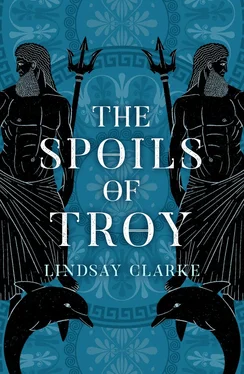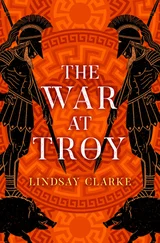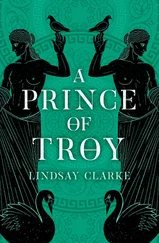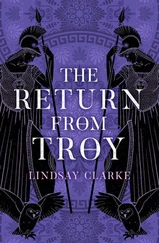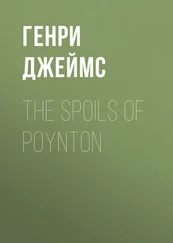‘I’ve no time for this,’ Agamemnon scowled. He was about to walk away when he was snagged by a need to justify himself further. He looked back at Odysseus again. ‘Your stratagem of the horse worked well, old friend. Troy is finished. Poets will still be singing of this victory a thousand years from now. And you’ll be back home on Ithaca soon enough, a rich man, tumbling your wife on that great bed of yours.’ He grinned through the smoke at the grim face that frowned back at him, white as wax, in the moonlight. ‘Think of it, Odysseus. Just think of it. We are immortal, you and I. Whatever happens, our names are deathless now.’
And with that, Agamemnon, King of Men, summoned his bodyguard around him once more and advanced towards King Priam’s palace.
All night long, not speaking, refusing to be touched, Menelaus prowled the bloody chamber where the bed had begun to stink like a butcher’s stall. Helen crouched in a corner, stifling her whimpers. Sometimes, as the night wind gusted, smoke blew into the room, charring the air. After a time the oil-lamp that had been left burning on a tripod guttered out. Now the darkness was almost complete.
Menelaus went to the balcony once to look for the source of the fire and saw that the mansion was in no immediate danger. Beneath him, a tumult of screaming people ran along the street, looking back over their shoulders to where a company of spearmen advanced towards them rattling their shields. But he took almost as little interest in what he saw as did the many corpses already cluttering the gutters. He was remembering those moments in the bull-court at Knossos when he had first heard the news of Helen’s defection – how the roaring of the crowd had dimmed in his ears so that it sounded like the distant throbbing of the sea; how time had wavered strangely, and he had been possessed by the feeling that nothing around him was quite real.
Now it was much the same, for he was as little moved by the sacking of this city as he had been by the antics of the dancers in the hot arena or by the sleek rage of the bull. All this din and terror amounted to nothing more than an incidental accompaniment to the unappeasable clamour of his grief.
Menelaus could no longer see what was to be done. He had come to Troy with a single clear purpose in mind. But Paris had escaped him, fleeing from their duel in the rain like the craven coward he was. And though he had fallen later to the arrows of Philoctetes, it was an end in which Menelaus could take no pleasure because it deprived him of the personal satisfaction he had sought. And then, when the sickening news came that Deiphobus had taken Helen to his bed, Menelaus had found a new and still more violent focus for his hatred. Because of this further insult to his heart, he had driven on the Argive generals to fight when it looked, for a time, as if the two exhausted armies might settle for a negotiated peace. He had reminded them of the oath they had sworn to him in Sparta. He had made it clear that he would be satisfied by nothing less than the death of Deiphobus. So the war had gone on and now the war was won. Troy had been taken, as Helen had been taken, by stealth and treachery. Deiphobus was dead, and Menelaus had made sure that he had known in the moment of his death exactly who it was that killed him. But his body lay on the bed like the joints of horse-meat on which the princes of Argos had sworn to defend Menelaus’s right to Helen, and his troubles were now over. Yet even as Menelaus had hacked at his body, severing the head and limbs and genitals with his sword, he had found no satisfaction in the act. His arms were sticky with the man’s blood. His face was splashed with it. And almost as strong as the grief in the King of Sparta’s heart was the wave of disgust that left him retching in the night.
And still Helen lived.
Already Menelaus knew that if he was going to kill her he should have done it when he first found her in bed beside Deiphobus. But he told himself that he had wanted her to see her lover die. He wanted her to know how terrible his vengeful fury was. He wanted her to see what she had done to him, to learn how she had turned his gentle heart into a murderous thing. So the moment in which he might have acted had passed. And still, as she crouched in the corner like a frightened animal, he could not bring himself to finish her.
Nor could he command anyone else to do the deed.
Menelaus walked back from the balcony into the room and stood leaning against the door. He was still holding his sword. With the back of his free hand he tried to wipe the flecks of vomit from his mouth only to realize that the hand itself was wet with blood.
What was to be done? What was to be done? All across the city his comrades exulted in their triumph. Agamemnon must already be sitting on Priam’s throne. Young Neoptolemus would be taking bloody vengeance for his father’s death. The others would be revelling in the slaughter, toasting each other in captured wine as the women fell into their hands, or stripping the sacked palaces and temples of their treasure. Only he on whose behalf this long war had been fought stood in the darkness, empty and wretched, rejoicing at nothing.
Though the pain of the memory was almost more than he could bear, he was remembering the days long ago, in another time, in another world, when he and his wife had played together with their little daughter Hermione in the sunlit garden of the citadel at Sparta. How could Helen have dreamed of turning her back on such happiness? What must he himself have lacked in manhood that she should have spurned the unquestioning, utterly trusting fidelity of his heart, for a mad act of passion that could only ever have ended in disaster such as this?
Never, in all the long years since Helen had left him, had Menelaus felt so utterly alone.
Odysseus stood alone in the lurid night, beating his brains with the knowledge that this catastrophe was of his making and that he had intended none of it. His plan had been clear enough. He had discussed it carefully with Agamemnon and secured his agreement. Odysseus had always maintained that the long-term gain must be greater if the victorious Argives exploited the trading strength of Troy’s position rather than merely despoiling the city of its wealth. With this larger aim in mind he had pursued his secret negotiations with Antenor and Aeneas, and he had done so in good faith, certain that King Priam and Deiphobus would be more easily deceived by the stratagem of the wooden horse if the distrusted minister and the vacillating Dardanian prince were seen to suspect it. So the city would fall by stealth and need hardly be damaged in the taking. Crowned as a client king once Priam was dead, Antenor would owe his throne and his loyalty to Agamemnon. The presence of a strong garrison in the city would underwrite the alliance. And then, with Troy secured as an Argive fiefdom commanding trade with the Black Sea, the entire eastern seaboard must sooner or later fall under Agamemnon’s control. Meanwhile, Odysseus would go home to Ithaca a wealthy man, having crowned the Lion of Mycenae as undisputed ruler of an Aegean empire.
It was more than a plan: it was a vision – a vision that would change the map of the known world for ever. Even as he had climbed the ladder into the wooden horse, Odysseus had been sure that Agamemnon understood the dream and shared it. But he had come out of Helen’s mansion and stepped into a massacre.
The fire, he was prepared to concede, might have started by accident. But if, with the low cunning and purblind greed of a common soldier, the King of Men had already decided to opt for quick profit rather than the long-term benefits of a less certain vision then the logic became inexorable. To prevent Troy rising again and descending on Argos with the force of the avenging Furies, the destruction must be complete. The city must be burned, its walls torn down, its men exterminated, its women carried away. So even as he licensed Odysseus to give the assurances demanded by Antenor and Aeneas in return for their defection, Agamemnon must have known this was what he would do. He must have been hugging himself with glee when the Trojan defectors accepted those assurances. And why should they not have done when Odysseus had also been deceived?
Читать дальше
